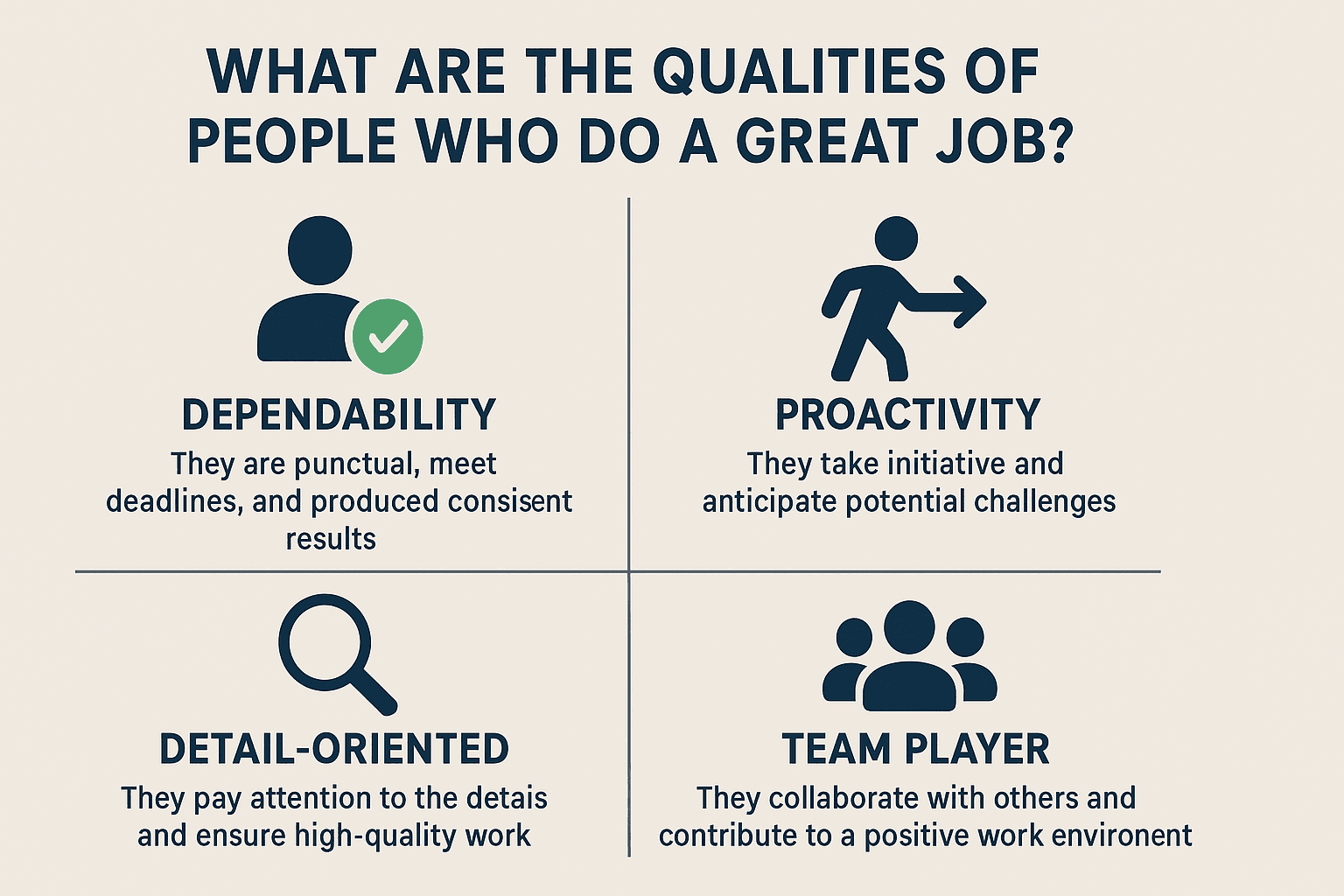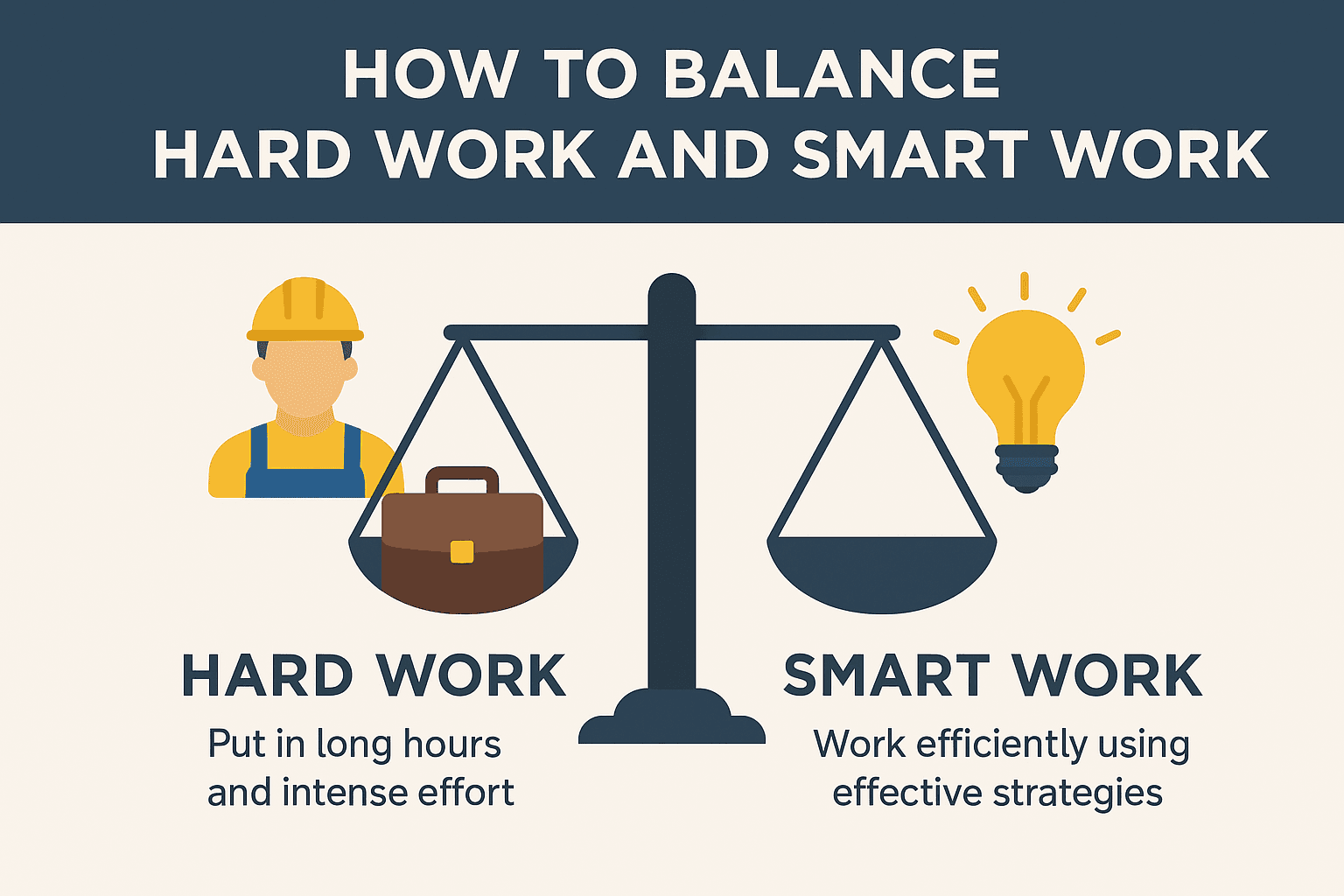business resources
How to Do a Great Job at Work: Proven Strategies for Career Growth
12 Sept 2025, 7:56 am GMT+1
Most people think doing a great job means working harder, but it’s really about smart habits that set you apart. From time management to building trust, small actions can transform your career growth. Want to know what truly makes the difference between a good job and a great one?
Do you ever wonder why some people seem to always impress at work, consistently going above and beyond, while others do just enough to get by?
In the UK today, only 24% of workers feel they have the right skills to move up in their careers. And nearly one-quarter (26%) say lack of career progression is one of the biggest frustrations in their job.
Want to be part of that smaller group who not only “do a good job” but always do a great job. Want to know what habits set them apart?
Let's first understand-
Why doing a great job matters
In any role, the difference between a good job and a great job is the impact you create.
Employers today are not just looking for people who meet expectations; they want professionals who go beyond. When you are consistently seen as someone who does a great job, you earn trust, responsibility, and respect. This leads to:
- Better chances of promotions and pay rises.
- Stronger professional reputation.
- More meaningful work opportunities.
- Long-term job security.
Doing a great job is not just about pleasing your boss. It also brings personal satisfaction. It helps you feel proud of your contribution and motivates you to keep improving.
Key qualities of people who do a great job

If you observe people in any workplace who are known for doing a great job, you’ll notice certain qualities. These are not about talent alone but about habits and mindset:
- Reliability – They deliver on promises and meet deadlines.
- Positive attitude – They stay calm and solution-focused even in challenges.
- Attention to detail – Small mistakes are rare because they double-check their work.
- Good communication – They keep everyone informed and avoid misunderstandings.
- Willingness to learn – They keep improving their skills instead of getting stuck.
- Team spirit – They support others and contribute to group success.
By developing these traits, you automatically put yourself in a better position to be noticed as someone who consistently does a great job.
Practical strategies to do a great job at work
Now let’s look at actionable steps you can take to do a great job every day. These are practical, realistic strategies you can apply immediately.
1. Understand what is expected
The first step to doing a great job is clarity. Many employees fail because they are not clear about what their manager or team expects. Always ask questions if tasks are unclear. Break projects into smaller parts and check in regularly with your boss to ensure you are on the right track.
2. Manage your time well
Time management is a skill that can make or break your performance. Start each day with a plan. List the top three priorities and focus on them first. Use simple tools like calendars, reminders, or even a notebook. Avoid multitasking too much, as it reduces focus and quality.
3. Take initiative
Doing only what is assigned may keep you safe, but it won’t make you stand out. People who do a great job often go beyond the basics. Look for small ways to help your team, suggest improvements, or volunteer for tasks. Initiative shows that you care about the bigger picture.
4. Communicate clearly
Miscommunication causes mistakes, delays, and frustration. To do a great job, practise clear communication. Whether in emails, meetings, or chats, be simple and direct. If you finish a task, let your manager know. If you face a problem, share it early instead of waiting.
5. Be consistent
Anyone can do well once in a while, but people who do a great job are known for consistency. Try to maintain steady performance. Delivering quality work regularly builds trust and makes your boss confident in giving you more responsibility.
6. Build good relationships
Work is not just about tasks. It’s also about people. Being respectful, supportive, and approachable helps you build strong relationships. When you have good relationships, teamwork becomes easier, and others will see you as someone who adds value beyond your role.
7. Keep learning
Workplaces are always changing. New tools, methods, and trends keep coming up. To do a great job, you need to stay updated. Attend training sessions, read about your industry, or ask for feedback to learn where you can improve. Lifelong learning is a key factor for career growth.
8. Stay Professional
Professionalism is about how you behave at work. Being punctual, dressing appropriately, staying polite, and keeping personal issues aside at work all show maturity. This professionalism makes people respect you and see you as someone who does a great job.
Common mistakes to avoid
Sometimes, the best way to do a great job is by avoiding common pitfalls that hold many people back. Here are mistakes to watch out for:
- Not listening properly – Missing details can affect your work.
- Procrastination – Delaying tasks often leads to poor quality.
- Negativity – Complaining too much can damage your image.
- Avoiding feedback – Not learning from mistakes limits growth.
- Overpromising – Always committing to more than you can handle makes you unreliable.
By being aware of these mistakes, you can stay on track and maintain your reputation for doing a great job.
Balancing hard work and smart work

Many people think doing a great job means working longer hours. But it’s not just about effort; it’s about working smart. Smart work includes:
- Using the right tools and technology to save time.
- Delegating tasks when possible.
- Focusing on high-value work rather than minor details.
- Knowing when to ask for help instead of struggling alone.
The balance of hard work and smart work ensures you stay productive without burning out.
The role of soft skills
Technical skills are important, but soft skills often make the difference between a good job and a great job. Employers value qualities like communication, adaptability, emotional intelligence, and teamwork.
For example, if you remain calm under pressure and help your team through challenges, you are more likely to be remembered as someone who does a great job.
How Doing a Great Job Supports Career Growth
Doing a great job has direct benefits for your career. Here’s how:
- Recognition – Your efforts get noticed by managers and peers.
- Opportunities – You may be trusted with bigger projects.
- Promotions – Consistent performance puts you on the list for career advancement.
- Networking – People like to work with high performers, expanding your professional circle.
- Confidence – The more you achieve, the more confident you become.
Every time you focus on doing a great job, you are investing in your long-term career growth.
Real-life examples of great job performance
Let’s look at a few examples that show how people can stand out:
- The problem solver – An employee noticed a process taking too long and suggested a simpler system that saved the team hours each week. This showed initiative and problem-solving ability.
- The dependable worker – Another team member always met deadlines, even during busy periods. Their manager trusted them with more responsibility, which later led to a promotion.
- The learner – A junior employee took extra time to learn new software that others found confusing. Soon, they were helping the whole team, gaining respect and visibility.
These stories show that a great job is not always about big achievements; small consistent actions can make a big difference.
Staying motivated in the long term
One challenge of doing a great job is staying motivated. Over time, routine can make people lose interest. Here are ways to keep your motivation alive:
- Set personal goals at work.
- Celebrate small wins.
- Find mentors who guide and inspire you.
- Take breaks to avoid burnout.
- Remind yourself why your work matters.
Motivation is like fuel; without it, even the best skills cannot help you maintain performance.
What doing a great job will mean in the digital future
Workplaces are changing fast with technology, remote work, and automation. But one thing remains the same: the need for people who do a great job. In the future, doing well will mean:
- Being adaptable to new tools and trends.
- Balancing technical and human skills.
- Showing initiative in solving modern workplace challenges.
- Bringing creativity and fresh ideas.
If you keep updating yourself and maintain the qualities of a strong professional, you will always stay ahead.
Conclusion
Doing a great job is not about luck or talent alone. It is about habits, mindset, and daily actions. By being reliable, proactive, professional, and always willing to learn, you can set yourself apart.
The journey requires effort, but the rewards, recognition, career growth, and personal satisfaction are worth it.
So, the next time you ask yourself how to stand out at work, remember: focus on doing a great job every day. The results will follow.
Share this
Shikha Negi
Content Contributor
Shikha Negi is a Content Writer at ztudium with expertise in writing and proofreading content. Having created more than 500 articles encompassing a diverse range of educational topics, from breaking news to in-depth analysis and long-form content, Shikha has a deep understanding of emerging trends in business, technology (including AI, blockchain, and the metaverse), and societal shifts, As the author at Sarvgyan News, Shikha has demonstrated expertise in crafting engaging and informative content tailored for various audiences, including students, educators, and professionals.
previous
Why You Should Rent a USA Phone Number Instead of Buying One
next
Editing Photos and Adding Them into Videos with CapCut Desktop